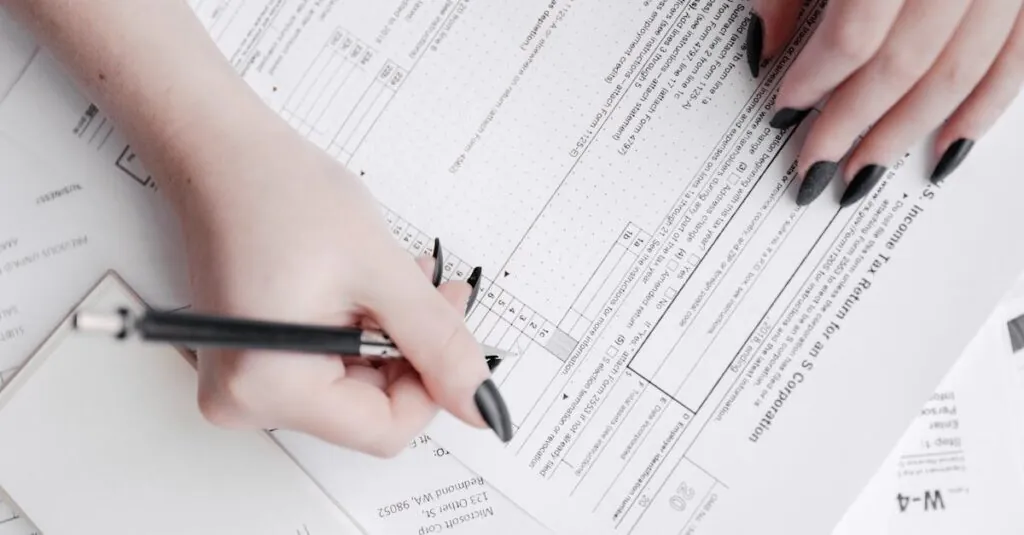Table of Contents
ToggleNavigating the FHA appraisal dispute process might feel like trying to find a needle in a haystack—blindfolded. But fear not! Understanding this often-overlooked aspect of home buying can save buyers from potential headaches and financial pitfalls. When an appraisal comes in lower than expected, it can throw a wrench in the home-buying process, leaving many scratching their heads and wondering what to do next.
But here’s the good news: disputing an FHA appraisal isn’t as daunting as it seems. With the right knowledge and approach, buyers can challenge those pesky valuations and pave the way to their dream home. Get ready to dive into the ins and outs of the FHA appraisal dispute process, where clarity meets confidence and maybe even a chuckle or two along the way.
Overview of FHA Appraisal Dispute Process
The FHA appraisal dispute process starts when an appraised value lower than the expected value impacts the buyer’s financing. Buyers often face challenges understanding how to approach disputes effectively. It helps to know that disputing an appraisal is possible if there’s substantial evidence for reconsideration. Key aspects play a role in this process, including accurately identifying comparable sales, market data, and specific property features.
Engaging with the lender early is crucial for guiding buyers through the dispute process. They often provide valuable insights regarding necessary documentation and procedures. Gathering supporting information enhances the chances of a successful dispute. This may include updated listings or recent sales data that align with the property’s characteristics.
An appraisal review process allows for a second examination of the appraisal value. When applicable, the lender submits a request for reconsideration directly to the appraiser. Providing clear and concise arguments during this process strengthens buyers’ cases. Following up on submitted documentation maintains communication flow with the lender.
Knowing the timeline for responses assists buyers in managing expectations. Typically, lenders respond within one to three weeks regarding the outcome of the dispute. After reevaluation, the appraiser may adjust the initial appraisal value or reaffirm it. When buyers receive a favorable adjustment, it often resolves financing issues and maintains the loan approval.
Navigating this process with knowledge empowers buyers. A clear understanding of the FHA appraisal dispute process increases their chances of achieving fair appraisals, ensuring their homeownership goals remain intact.
Importance of Understanding the FHA Appraisal Dispute Process
Understanding the FHA appraisal dispute process significantly affects both borrowers and lenders. For borrowers, knowledge of the process leads to informed decisions regarding disputes.
Implications for Borrowers
Borrowers face financial consequences when appraisals undervalue properties. Accessing the FHA appraisal dispute process allows borrowers to challenge these valuations effectively. Engaging their lenders early in the process can lead to valuable support and insight. Gathering relevant data on comparable sales or property features increases their chances of a successful appeal. A successful dispute can prevent funding delays while facilitating homeownership. Consequently, being proactive and informed empowers buyers to navigate obstacles, ensuring favorable appraisal outcomes.
Implications for Lenders
Lenders also experience significant impacts from the FHA appraisal dispute process. Effective appraisal disputes can enhance financial stability and maintain workflow efficiency. Lenders benefit from understanding what qualifies as substantiated evidence when dealing with borrower disputes. They play a crucial role by offering guidance throughout the appraisal review process. Prompt responses can improve client satisfaction and prevent funding bottlenecks. A favorable resolution not only supports borrowers in achieving financing but also strengthens lender-borrower relationships. Thus, knowledge of the dispute process serves as a beneficial asset for both parties.
Steps in the FHA Appraisal Dispute Process
Understanding the FHA appraisal dispute process facilitates navigating challenges that arise from low appraisals. Here’s a detailed breakdown of the steps involved.
Initial Appraisal Review
Begin by reviewing the initial appraisal report thoroughly. Identify discrepancies in property details or valuation methods. Compare the appraised value against local market trends and recent sales data. Ensure the appraisal aligns with comparable properties to support your case. Engaging a knowledgeable agent can help clarify the findings and strengthen your assessment. A comprehensive review establishes a solid foundation for the next stage, especially if the value doesn’t match expectations.
Filing a Dispute
After reviewing, proceed with filing a dispute if discrepancies are evident. Contact the lender promptly to initiate the process and gather relevant documentation. Compile supporting materials, including up-to-date listings, neighborhood data, and specific property features, to bolster the argument. Draft a clear and concise letter presenting the facts of the dispute, emphasizing the evidence collected. Provide context to assist the lender’s submission of the reconsideration request. A well-organized dispute enhances chances for a favorable outcome.
Appraisal Reconsideration
Next, the lender submits the appraisal reconsideration request on behalf of the buyer. This request involves sending the compiled evidence to the original appraiser for review. Highlight the critical information and clarify why the initial valuation requires adjustment. Set realistic expectations regarding the response timeline, as appraisers generally reply within one to three weeks. Effective communication with the lender throughout this stage ensures that all parties remain aligned and informed. A swift and favorable response can lead to necessary amendments, potentially securing financing requirements.
Common Reasons for FHA Appraisal Disputes
FHA appraisal disputes often arise from specific issues that impact property values. Understanding these common reasons helps buyers prepare effective arguments.
Property Condition Issues
Property condition plays a significant role in appraisal values. Sometimes, appraisers overlook damages or discrepancies that affect market value. Common problems include structural defects, outdated systems, or unresolved maintenance issues. Buyers can dispute appraisals if they provide evidence of necessary repairs or recent upgrades. Supporting documentation like inspection reports or photographs strengthens their case. By clearly outlining the property’s condition, buyers clarify discrepancies during the dispute process.
Valuation Errors
Valuation errors frequently occur during appraisals. Pricing discrepancies arise when appraisers use outdated or incorrect data for comparable properties. Buyers should review the appraisal report for inaccuracies in square footage, features, or neighborhood characteristics. Highlighting these errors can lead to successful disputes. Comparing recent sales data directly supports arguments for a re-evaluation. Once buyers compile this information, presenting it to the lender fosters a constructive dialogue. This way, buyers enhance their chances of a favorable adjustment in the appraisal.
Tips for a Successful Dispute
Navigating the FHA appraisal dispute process requires careful preparations and a strategic approach. Focusing on specific actions can significantly enhance the likelihood of a favorable outcome.
Gathering Evidence
Collecting specific evidence stands as a crucial step in the dispute process. Recent sales data provides context to support claims against low appraisals. Using comparable properties helps establish realistic benchmarks for value. Updated listings also strengthen arguments, especially those showcasing similar features and conditions. Documenting property improvements or repairs can further substantiate claims, reinforcing the case against an undervalued appraisal. Including photographs or inspection reports offers tangible proof of condition and updates made. Every piece of information contributes to creating a credible narrative, increasing the chances of reversal.
Working with Professionals
Collaborating with experienced professionals adds substantial value to the dispute process. Engaging a qualified real estate agent can provide access to local market insights and data. Their expertise in specific neighborhoods helps identify relevant comparables for valuation. Consultations with appraisers also offer perspectives on where discrepancies may arise. Understanding the evaluation methods provides a clearer foundation for challenges. Additionally, a knowledgeable attorney can assist in navigating complex documentation requirements and regulations. Every professional input can clarify the dispute strategy, leading to better outcomes.
Navigating the FHA appraisal dispute process can be daunting but with the right approach and preparation, buyers can effectively advocate for themselves. Understanding the key steps and gathering substantial evidence are crucial for a successful appeal. By maintaining open communication with lenders and presenting clear arguments, buyers can significantly improve their chances of achieving a favorable outcome. This process not only empowers them in their homeownership journey but also reinforces the importance of being informed and proactive. With the right strategies in place, buyers can turn appraisal challenges into opportunities for success.







